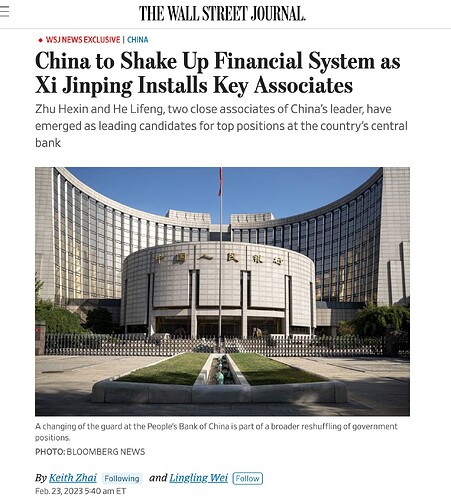-
中国领导人习近平正准备动摇该国的金融体系,他安排了一些关键人物来管理中央银行,并恢复了一个共产党机构以加强政治控制。
-
这些举措是习近平重塑这个世界第二大经济体的努力的一部分,并削弱了中央银行和其他金融监管机构的独立地位。
-
中国金融集团中信集团有限公司董事长朱鹤新是接替受过美国教育的经济学家易纲担任中国人民银行行长的主要候选人,尽管这一决定还没有最终确定,只有在3月初的中国年度立法会议上才会正式作出。
-
朱鹤新不太可能成为中国人民银行的党委书记,这是中央银行中最有权力的职位。习近平先生的长期助手何立峰可能会兼任中国人民银行的党委书记一职。这将为中国人民银行提供更有力的政治支持,但也会削弱其权威,因为它将不得不更直接地对国务院负责。
-
中央银行的官员已经被提醒,货币当局对党负责,这削弱了它对投资者和经济学家的作用。新的领导层将需要帮助经济从新冠限制和有史以来最严重的房地产衰退中恢复。
-
在习近平先生第三次担任总书记之后,中央银行的换届是更广泛的改组的一部分。此后,他塑造了一个主要由其盟友组成的经济团队。
-
中国共产党正计划恢复其中央金融工作委员会,这是一个在1998年至2003年间存在的政策制定机构。办公室主任丁薛祥和中国新的第二号领导人李强是监督该委员会运作的潜在人选。该委员会的目的是将金融监管事务整合到一个机构之下。
-
温家宝是副总理和党的精英政治局成员,他从委员会成立到解散一直领导着委员会,这被视为他为总理职位做准备的一个潜在迹象。目前具有政治地位、技术官僚技能和全球市场信誉的官员,如刘鹤、郭树清和易纲等,基本上已经从党的上层消失了。
-
中国人民银行和国务院新闻办公室没有对评论请求作出回应。此举是习近平先生调整领导层的一部分。
-
预计刘先生将通过后台信息促进中国和美国之间的第二轨道对话。
-
刘鹤先生被派往1月份的世界经济论坛,宣布中国在与世隔绝后重新开放业务。
-
朱鹤新先生在中国以外的地方不太出名,也没有其他高级央行官员那样的国际地位。
-
朱鹤新先生毕业于上海财经大学,在交通银行股份有限公司和中国银行有限公司工作到2018年。
-
从2018年到2020年,朱鹤新先生担任中国人民银行副行长,负责监督金融稳定。
-
自2020年以来,朱鹤新先生一直担任中信集团的董事长。
-
中信集团的利益横跨银行、证券经纪、私募股权和保险,并在拯救中国华融资产管理有限公司方面发挥了重要作用。
-
前几任中国人民银行行长过去曾担任过兼职,但何立峰的任命标志着自20世纪90年代以来,首次有副总理在央行担任正式职务。
-
2013-2018年,周小川在这个最高政府咨询机构中担任礼仪性的副主席职务。
-
易会满和殷勇曾被认为是行长职位的有力候选人。
-
现任行长易会满在央行之外没有任何额外的角色。
-
中国人民银行现任党委书记郭树清先生对该行的内部决策过程有重大影响,实际上取代了易纲的权力。
-
党的精英中央委员会将于2月26日至28日召开全体会议,讨论党和国家组织的变革。
-
这次会议被称为第二次全会,传统上用于讨论人事任命和其他政治问题,然后再确定五年任期内的新政府人选。
-
Chinese leader Xi Jinping is preparing to shake up the country’s financial system by installing key associates to run the central bank and reviving a Communist Party body to tighten political control.
-
The moves are part of Xi’s efforts to reshape the world’s second-largest economy and reduce the independent status of the central bank and other financial regulators.
-
Zhu Hexin, chairman of the Chinese financial conglomerate Citic Group Corp., is the leading candidate to succeed U.S.-educated economist Yi Gang as governor of the People’s Bank of China, though the decision isn’t final and will only be made formal at China’s annual legislative session in early March.
-
Mr. Zhu is unlikely to become the Communist Party Secretary of the People’s Bank of China, the most powerful post in the central bank. He Lifeng, a longtime associate of Mr. Xi, is likely to take a concurrent post as the PBOC’s party chief. This will give stronger political backing to the PBOC, but also erode its authority as it will have to answer more directly to the State Council.
-
Officials at the central bank have been reminded that the monetary authority answers to the Party, diminishing its usefulness to investors and economists. The new leadership will need to help the economy recover from the Covid restrictions and the worst property downturn on record.
-
The changing of the guard at the central bank is part of a broader reshuffling following Mr. Xi’s third term as general secretary. He has since shaped an economic team that mostly consists of his allies.
-
China’s Communist Party is planning to resurrect its Central Financial Work Commission, a policy setting body that existed between 1998 and 2003. Chief of staff Ding Xuexiang and Li Qiang, China’s new No. 2 leader, are potential candidates to oversee the commission’s operations. The commission is intended to consolidate financial regulatory matters under one authority.
-
Wen Jiabao, a vice premier and member of the party’s elite Politburo, led the commission from its inception until its dissolution, seen as a potential sign of his grooming for the premiership. Current officials with political standing, technocratic skills, and credibility in the global markets have largely disappeared from the upper echelons of the party, such as Liu He, Guo Shuqing, and Yi Gang.
-
The People’s Bank of China and the State Council Information Office have not responded to requests for comment. This move is part of Mr. Xi’s reshuffling of his leadership ranks.
-
Mr. Liu is expected to facilitate track-two dialogue between China and the U.S. through backchannel messages.
-
Mr. Liu was dispatched to the World Economic Forum in January to make the announcement that China was reopening for business after Covid isolation.
-
Mr. Zhu is lesser known outside of China and lacks the international stature of other senior central bank officials.
-
Mr. Zhu graduated from Shanghai University of Finance and Economics and worked at Bank of Communications Co. and Bank of China Ltd. until 2018.
-
From 2018 to 2020, Mr. Zhu served as a PBOC deputy governor overseeing financial stability.
-
Mr. Zhu has served as Chairman of Citic Group since 2020.
-
Citic Group has interests spanning banking, securities brokerage, private equity and insurance, and has played a significant role in rescuing China Huarong Asset Management Co.
-
Previous PBOC chiefs have held concurrent positions in the past, but He’s appointment marks the first time since the 1990s that a vice premier has held a formal post at the central bank.
-
Zhou Xiaochuan held a ceremonial vice chair role in the top government advisory body from 2013-2018.
-
Yi Huiman and Yin Yong were once considered strong candidates for the governor role.
-
The incumbent governor, Mr. Yi, does not have any additional roles outside the central bank.
-
Mr. Guo, the PBOC’s current party secretary, has significant influence over the bank’s internal decision-making processes, effectively superseding Mr. Yi’s authority.
-
The party’s elite Central Committee will convene a plenary session from Feb. 26-28 to discuss changes to party and state organizations.
-
This meeting, known as the second plenum, is traditionally used to discuss personnel appointments and other political issues before a new government bench is finalized for a five-year term.
链接:China to Shake Up Financial System as Xi Jinping Installs Key Associates - WSJ
